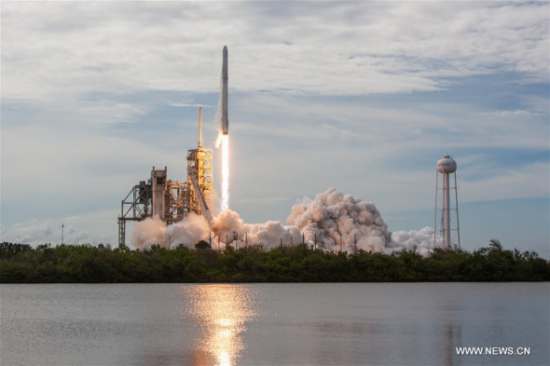 The photo made available by U.S. space firm SpaceX on June 3, 2017 shows the company's Falcon 9 rocket launching at the Kennedy Space Center in Florida, the United States. U.S. space firm SpaceX on Saturday launched supplies to the International Space Station, including an experiment from a Chinese university that will test the effects of space environments on DNA. (Xinhua) U.S. space firm SpaceX on Saturday launched supplies to the International Space Station, including an experiment from a Chinese university that will test the effects of space environments on DNA. The SpaceX Dragon cargo spacecraft lifted off on the company's Falcon 9 rocket at 5:07 p.m. EDT (2107 GMT) from the Kennedy Space Center in Florida. About 10 minutes later, the rocket's first stage achieved a successful landing at SpaceX's Landing Zone 1, just south of the launch site at Cape Canaveral Air Force Station. On this trip, the Dragon will deliver almost 6,000 pounds (2,700 kilograms) of supplies, including solar panels, tools for Earth-observation and equipment to study neutron stars. Among the cargo is a 3.5-kilogram device from the Beijing Institute of Technology that sought to answer questions like "Does the space radiation and microgravity cause mutations among antibody-encoding genes and how does it happen?" There is a U.S. law in place, known as the Wolf amendment, that bans cooperation between the U.S. space agency NASA and Chinese government entities, but this deal is purely commercial and therefore considered legal. NASA spokesperson Kathryn Hambleton confirmed to Xinhua that there is a Chinese experiment that is launched on this mission, known as SpaceX CRS-11. "NASA complied with all legal requirements to notify the Congress of this activity, and all of the ISS partners approved the inclusion of the experiment," Hambleton said in an email. |